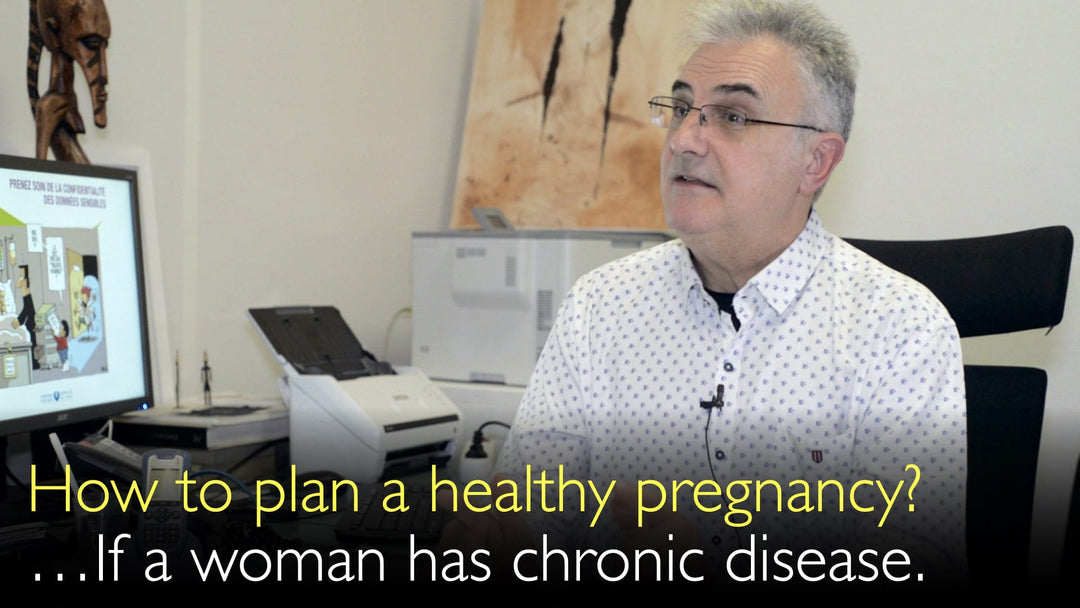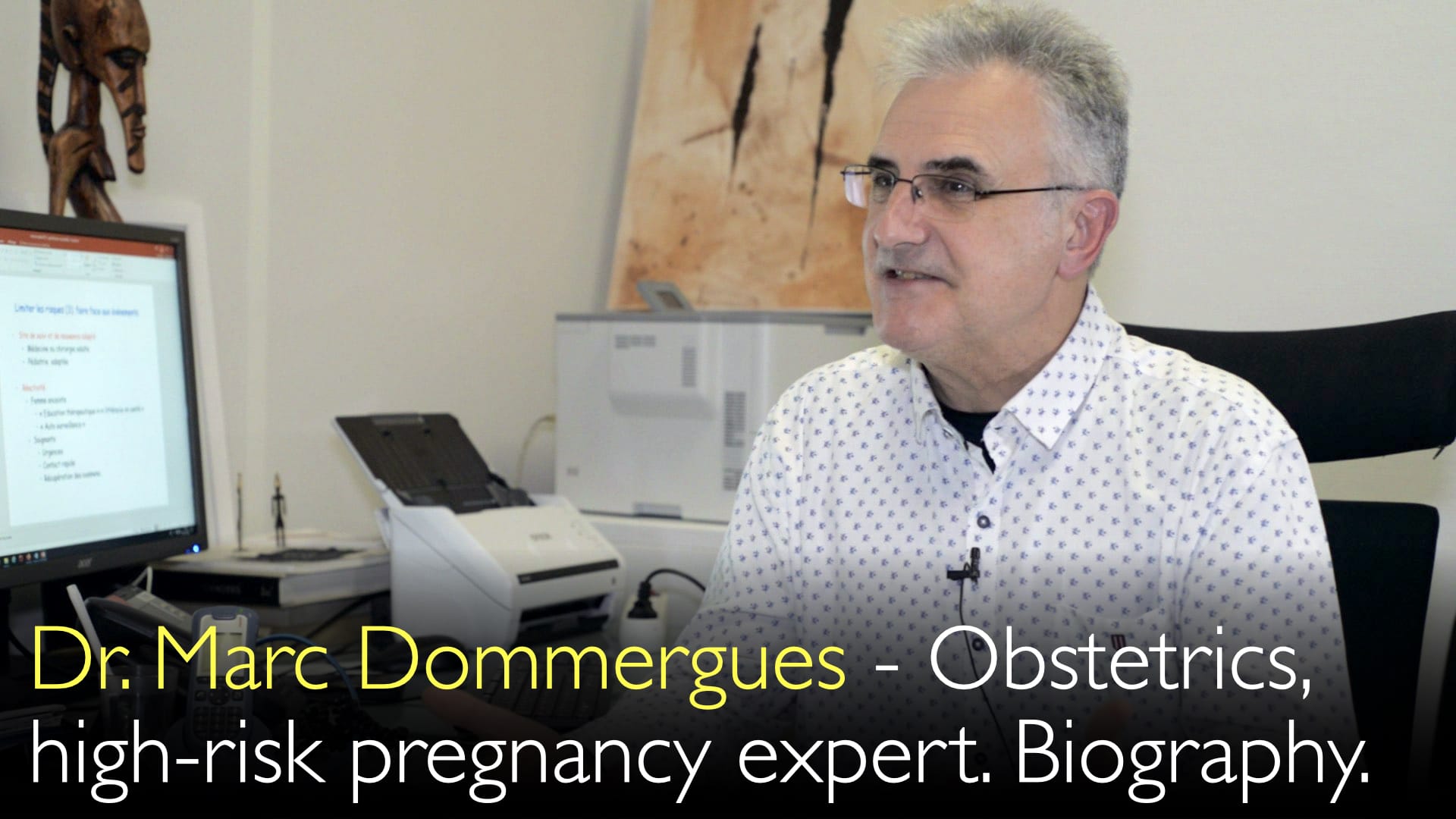Johtava asiantuntija korkean riskin raskaussuunnittelussa, tohtori Marc Dommergues, MD, käsittelee kroonista sairautta sairastavien naisten keskeisiä vaiheita terveen raskauden saavuttamiseksi. Hän korostaa ennakkoneuvonnan ratkaisevaa merkitystä, lääkkeiden riskinarviointia ja erikoistuneiden ammattilaisten moniammatillista yhteistyötä.
Raskauden suunnittelu kroonisen sairauden kanssa: Vaiheittainen opas
Hyppää osioon
- Esikonseptioklinikan merkitys
- Sairauden vaikutukset raskauteen
- Raskauden vaikutukset sairauteen
- Lääkkeiden riskinarviointi
- Sikiön epämuodostumien riskit
- Vauvaan kohdistuvat tilapäisvaikutukset
- Imetykseen liittyvät näkökohdat
- Tietoon perustuva päätöksenteko
Esikonseptioklinikan kriittinen rooli
Kroonista sairautta sairastavalle naiselle ensimmäinen ja tärkein askel raskauden suunnittelussa on hakeutua erikoissairaanhoitoon. Lääketieteen tohtori Marc Dommergues korostaa 'esikonseptioklinikan' merkitystä. Kyse on erikoistuneesta synnytyslääkärin konsultaatiosta, jossa on potilaan sairaustyypin erityisosaamista. Prosessi alkaa potilaan täydellisen sairaushistorian ja tietojen perusteellisella läpikäynnillä.
Käynnin tuloksena saadaan kattava terveystieto sekä suullisesti että yksityiskohtaisena kirjallisena selvityksenä. Tämä asiakirja mahdollistaa potilaan harkita vaihtoehtojaan huolellisesti, keskustella niistä muiden lääkäreidensä kanssa ja neuvotella perheensä kanssa, muodostaen perustan kaikille myöhemmille päätöksille.
Sairauden vaikutusten arviointi raskauteen
Esikonseptioneuvonnan ensisijainen tavoite on ymmärtää, miten olemassa oleva krooninen sairaus voi vaikuttaa raskauteen. Tämä analyysi on elintärkeä mahdollisten komplikaatioiden ennakointia ja proaktiivisen hoitosuunnitelman laatimista varten. Potilaiden usein välittömimpänä huolenaiheena, kuten tohtori Dommergues toteaa, on heidän käyttämänsä lääkitys.
On erittäin vaarallista keskeyttää tarvittavat lääkkeet pelosta ilman asianmukaista lääketieteellistä ohjausta. Tämä on keskeinen syy, miksi esikonseptiotapaaminen on niin tärkeä, sillä se tarjoaa turvallisen tilan käsitellä näitä pelkoja näyttöön perustuvalla tiedolla.
Raskauden vaikutusten ymmärtäminen sairauteen
Raskaus aiheuttaa merkittäviä fysiologisia muutoksia, jotka voivat muuttaa kroonisen sairauden kulkua. Hormonaaliset muutokset, veren määrän kasvu ja immuunitoiminnan muutokset voivat aiheuttaa ennalta olevan sairauden pahenemisen, parantumisen tai pysymisen vakaina. Lääketieteen tohtori Marc Dommergues korostaa, että tämä käänteinen suhde on arvioitava.
Sairaudesta ja synnytyksestä perillä oleva erikoilääkäri voi ennakoida nämä mahdolliset muutokset ja säätää hoitosuunnitelmia vastaavasti ylläpitääkseen äidin terveyttä koko raskauskauden ajan.
Kattava lääkkeiden riskinarviointi
Lääkkeiden turvallisuus raskauden aikana on monimutkainen ja ensiarvoisen tärkeä huolenaihe. Tohtori Dommergues esittää, että arviointi sisältää useiden erityyppisten mahdollisten vaikutusten määrittämisen sikiöön. Ensimmäinen askel on selvittää, aiheuttaako lääke tunnettua riskiä sikiön epämuodostumille.
Monille lääkkeille tarkat riskit eivät ole täysin tiedossa. Tässä yhteistyö teratogeenitietopalveluiden kanssa, jotka toimivat monissa maissa, on korvaamatonta. Nämä asiantuntijat pääsevät käsiksi julkaistuun dataan, julkaisemattomaan dataan lääkeyhtiöiden laboratorioista ja kliinisten tapaustietokantoihin, tarjoten ajantasaistetut riskiprofiilit.
Sikiön epämuodostumien riskien arviointi
Kun lääkkeen tiedetään aiheuttavan teratogeenistä riskiä, esikonseptioklinikka tarjoaa yksityiskohtaista tietoa. Lääketieteen tohtori Marc Dommergues selittää, että potilaiden on ymmärrettävä mahdollisten epämuodostumien esiintymistiheys, spesifiset epämuodostumatyypit, jotka voivat ilmetä, ja miten näitä voidaan tunnistaa esisynnytyksellisen seulonnan avulla. Tämä tieto mahdollistaa tietoon perustuvan päätöksenteon siitä, jatketaanko, säädelläänkö vai vaihdetaanko lääkitystä ennen raskauden alkamista, minimoiden siten riskiä.
Vauvaan kohdistuvien tilapäisvaikutusten hallinta
Jotkut lääkkeet eivät aiheuta pysyviä epämuodostumia, mutta voivat aiheuttaa tilapäisiä vaikutuksia vastasyntyneen terveyteen. Kuten tohtori Dommergues kuvailee, psykotrooppiset lääkkeet tai tietyt epilepsialääkkeet voivat aiheuttaa vauvan olevan vetelä tai unelias elämän ensimmäisinä päivinä ja saattavat aiheuttaa vieroitusoireyhtymän.
Nämä tilat ovat tyypillisesti tilapäisiä ja niitä voidaan hoitaa tehokkaasti lastenlääkäreillä, joilla on kokemusta äidin lääkityksen alaisena olleiden vastasyntyneiden hoidosta. Ennakkotietoisuus tästä mahdollisuudesta varmistaa, että vauva saa asianmukaista hoitoa synnytyksen jälkeen välittömästi.
Imetykseen liittyvien näkökohtien navigointi
Päätös imettää lääkityksen ollessa käynnissä on toinen kriittinen aihe, jota käsitellään esikonseptiosuunnittelun aikana. Tohtori Dommergues huomauttaa, että jos lääke on merkittävissä pitoisuuksissa rintamaidossa, se voi siirtyä imeväiselle. Joissakin tapauksissa voi olla järkevintä valita olla imettämättä välttääkseen vastasyntyneen altistumisen.
Asenteet lääkitystä ja imetystä kohtaan voivat vaihdella maittain ja jopa lääkäreiden kesken, mikä korostaa varhaisen keskustelun tarvetta perheen mukavan ja turvallisen päätöksen saavuttamiseksi.
Tietoon perustuvan päätöksenteon voima
Kaikkien näiden vaiheiden lopullinen tavoite on voimaannuttaa potilasta. Kuten lääketieteen tohtori Marc Dommergues päättelee, runsaasti aikaa yksityiskohtaisten tietojen käsittelyyn, niistä keskusteluun moniammatillisen lääketieteellisen tiimin kanssa ja perheensä neuvonpitoon on korvaamatonta. Tämä perusteellinen ja yhteistyöhön perustuva lähestymistapa raskauden suunnitteluun kroonisia sairauksia sairastaville naisille lisää merkittävästi mahdollisuuksia menestyksekkääseen ja terveelliseen lopputulokseen sekä äidille että vauvalle.
Koko tekstitys
Lääketieteen tohtori Anton Titov: Professori Dommergues, erikoistut suunnittelemaan raskautta naisille, joilla on erilaisia kroonisia sairauksia. Joten jos jollakin on sairaus, joka voi vaikeuttaa raskautta, mitä nainen voi tehdä varmistaakseen, että raskauden suunnittelu tehdään asianmukaisesti ja oikein, ja että raskaus on onnistunut?
Lääketieteen tohtori Marc Dommergues: On olemassa vaiheita, jotka eivät ole lainkaan spesifisijä. Kuten tavallisesti, hänen tulisi lopettaa tupakointi ja alkoholin käyttö. Hänen tulisi ottaa foolihappotabletteja ja tehdä tavalliset verikokeet, kuten HIV-testi jne.
Mutta sitten, kun kyseessä on joku, jolla on krooninen sairaus, ensimmäinen kohta on, että nainen tulisi keskustella raskaudesta lääkärin kanssa, joka yleensä vastaa hänen sairaudestaan. On myös erittäin tärkeää, että hän kävisi synnytyslääkärillä, joka tuntee hänen sairautensa tyypin. Tätä kutsumme 'esikonseptioklinikaksi'.
Tässä esikonseptioklinikassa ensimmäinen osa on oppia henkilön historia, saada kaikki tiedot ja lääketieteelliset data, ja sitten antaa tietoa potilaalle, ensin suullisesti ja sitten kirjallisena selvityksenä, joka antaa yksityiskohtia, joita potilas voi pohtia, keskustella lääkäreidensä kanssa ja keskustella perheensä kanssa. Tämä mahdollistaa hänen saada riittävän terveystiedon.
Lääketieteen tohtori Anton Titov: Joten tiedon saanti on ensimmäinen askel.
Lääketieteen tohtori Marc Dommergues: Ja on olemassa yksinkertainen tapa tarjota sitä. Ensinnäkin on tärkeää harkita sairauden mahdollisia vaikutuksia raskauteen. Sitten meidän on harkittava raskauden vaikutuksia sairauteen.
Mitä tulee sairauden vaikutuksiin raskauteen, luultavasti ensimmäinen kysymys on henkilön käyttämien lääkkeiden kysymys. Se on suuri pelko tuleville raskaana oleville naisille, että he saattaisivat ottaa lääkkeitä, jotka voivat vahingoittaa vauvoja. On tietysti erittäin vaarallista keskeyttää tarvitsemasi lääkkeet, lopettaa ne pelkästään pelon vuoksi. Tämä on yksi syistä, miksi esikonseptiotapaaminen on erittäin tärkeä.
Havainnollistaakseni, lääkkeillä voi olla erityyppisiä vaikutuksia sikiöön. Ensimmäinen vaikutustyyppi on, että lääkkeet voivat aiheuttaa sikiön epämuodostumia. Sitten on tärkeää tietää, mikä on sikiön epämuodostumien esiintymistiheys, minkä tyyppisiä epämuodostumia, ja miten epämuodostumia voidaan tunnistaa. Joissakin tapauksissa emme vain tiedä tarkkoja riskejä tietyn lääkkeen aiheuttaa epämuodostumia.
On tärkeää vaihtaa tietoa raskaudenaikaisista lääkkeistä asiantuntijoiden kanssa, jotka keskittyvät lääkkeiden vaikutuksiin sikiöihin. Nämä asiantuntijat toimivat eri maissa. He voivat tarjota meille julkaistua dataa, mutta myös julkaisematonta dataa, joka kuuluu laboratorioille, tai tietoa kliinisistä tapauksista, joista on raportoitu heidän keskuksiinsa.
Lääketieteen tohtori Anton Titov: Joten ensimmäinen kohta arvioida mitä tahansa raskaudenaikaisia lääkkeitä olisi selvittää, aiheuttavatko nämä lääkkeet riskiä sikiön epämuodostumille vai onko lääkkeellä pitkäaikaisvaikutus vauvaan aiheuttamatta epämuodostumia.
Lääketieteen tohtori Marc Dommergues: Toinen lääkkeen vaikutustyyppi on, että lääke vaikuttaa tilapäisesti vauvan terveyteen. Esimerkiksi, jos otat psykotrooppisia lääkkeitä tai joitakin epilepsialääkkeitä, vauva saattaa olla vetelä ja unelias muutaman päivän ajan, ja sitten saattaa saada vieroitusoireyhtymän. Yleensä tämä paranee spontaanisti lastenlääkäreiden antaman vauvanhoidon avulla, jotka ovat tottuneet hoitamaan äitinsä lääkityksen alaisia vauvoja. Mutta tämä on jotain, mikä on otettava huomioon.
Joskus on otettava huomioon imetykseen liittyvä kysymys. Esimerkiksi voi olla järkevä valinta olla imettämättä, jos maidossa on merkittäviä lääkepitoisuuksia, jotka voivat siirtyä maidosta vauvaan. Tämä on usein kiistanalaista. Eri maissa lääkäreillä voi olla erilaisia mielipiteitä siitä, mitä tulisi tehdä.
Tietysti mitä enemmän aikaa tulevalla äidillä ja perheellä on pohtia tätä, sitä parempi. Koska se auttaa päätöksenteossa. Tämä oli kohta numero yksi: lääkkeet.








